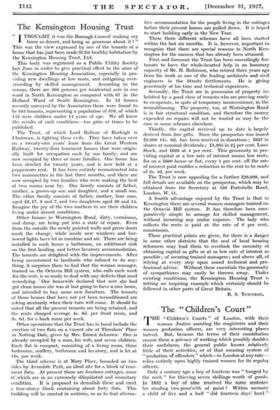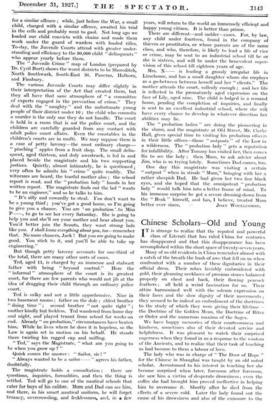The " Children's Court" r E "Children's Courts" of London, with their
woman Justice assisting the magistrate and their women probation officers, are very interesting places indeed. But, because the terms of their constitution ensure them a privacy of working which 'possibly doubles their usefulness, the general public knows relatively little of their activities, or of that amazing system of "probation of offenders" which—in London at any rate— relies entirely upon highly trained women for its regular officers.
Only a century ago a boy of fourteen was "hanged by the neck" for thieving seven shillings worth of goods. In 1832 a boy of nine received the same sentence for stealing two .penn'o'th of paint I' Within memory a- child of five and -a half- did fourteen days' hard "- for a similar offence ; while, just before the War, a small child, charged with a similar offence, awaited his trial in the cells and probably went to gaol. Not long ago we loaded our child convicts with chains and made them work under the guard of warders with loaded rifles.
To-day, the Juvenile Courts attend with greater under- standing and efficiency to the 30,000 child " delinquents " who appear yearly before them.
The "Juvenile Crime" map of London (prepared by Dr. Cyril Burt) shows the worst districts to be Shoreditch, North Southwark, South-East St. Pancras, Holborn, and Finsbury.
The various Juvenile Courts may differ slightly in their interpretation of the Act that created them, but they all have that sane atmosphere of "a committee of experts engaged in the prevention of crime." They deal with the " naughty " and the unfortunate young people of their district under 16; the child who commits a murder is the only one they do not handle. The court is held in a room that is not the police court, and the children are carefully guarded from any contact with adult police court affairs. Even the constables in the children's courts are in mufti. We may suppose there is a case of petty larceny—the most ordinary charge- " pinching " apples from a fruit shop. The small delin- quent, aged thirteen, and duly awestruck, is led in and placed beside the magistrate and his two supporting justices. Quietly, almost intimately, he is questioned ; very often he admits his " crime " quite readily. The witnesses arc heard, the tearful mother also ; the school report is read, and the "probation lady" hands in her written report. The magistrate finds out the lad "wants to be an engineer," and so he talks to him.
"It's silly and cowardly to steal. You don't want to be a young thief ; you've got a good home, so I'm going to give you a chance. You are on probation '.to Miss P—, to go to see her every Saturday. She is going to help you and she'll see your mother and hear about you.
You'd better join the Scouts, they want strong lads like you. I shall know everything about you, too—remember that. No more chances, Jack ! But you are going to make good. You stick to it, and you'll be able to take up engineering."
But though petty larceny accounts for one-third of the total," there are many other sorts of cases.
Ted, aged 11, is charged by an immense and stalwart father with being "beyond control." Here the " informal " atmosphere of the court is its greatest asset, for there are few parents who would not jib at the idea of dragging their child through an ordinary police court.
Ted is sulky and not a little apprehensive. Nine in two basement rooms ; father on the dole ; eldest brother "doing time " ; second brother "not quite right " ; mother kindly ,Intit feckless. Ted wandered from home day and night, an played truant from school for weeks on end. - Already on probation," circumstances have beaten hinrc While- he Jives where he does it is hopeless, so the Law is again set in motion on his behalf. He stands there twirling his ragged cap and sniffing.
" Ted," says the Magistrate, "what are you going to be when you grow up ? "
• Quick comes the answer : "Sailor, sir ! "
"Always wanted to be a sailor " agrees his father, doubtfully.
The magistrate holds a consultation ; there are questions, inquiries, formalities, and then the thing is settled. Ted will go to one of the nautical schools that cater for boys of his calibre. Mum and Dad can see him, and there, in his smart ,nautical uniform, he will forget truancy, overcrowding, and fecklessness, and, in a few years, will return to the world an immensely efficient and happy young citizen. It is better than prison.
There are different—and sadder—cases. For, by law, any child under fourteen, found in the company of thieves or prostitutes, or whose parents are of the same class, and who, therefore, is likely to lead a life of vice or crime, may be sent to an industrial school till he or she is sixteen, and will be under the benevolent super- vision of this school till eighteen years of age.
Mrs. X— is leading a grossly irregular life in Limehouse, and has a small daughter whom she employs as a go-between between herself and her "clients." The mother attends the court, sullenly enough ; and her life is reflected in the prematurely aged expression on the face of Lily, aged nine. The child is lodged in a remand home, pending the completion of inquiries, and finally is sent to an excellent industrial school, where she will have every chance to develop in whatever direction her abilities may lie.
The "probation ladies " are doing the pioneering in the slums, and the magistrate at Old Street, Mr. Clarke Hall, gives special time to visiting his probation officers in their little offices—those "outposts " of the Law in a wilderness. The "probation lady" gets a reputation for infallibility. After Tommy has visited her, then conies Sis to see the lady ; then Mum, to ask advice about Jim, who is so trying lately. Sometimes Dad comes, too.
One day this magistrate was visiting a certain "outpost " when in strode "Mum," bringing with her a rather sheepish Dad. He had given her two fine black eyes, and she hoped that the omnipotent "probation lady" would talk him into a better frame of mind. To his immense surprise he got a severe dressing-down from the " Beak " himself, and has, I believe, treated Mum



























 Previous page
Previous page